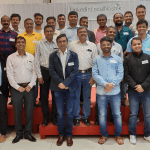With its strong domain expertise Winjit has provided end to end management solutions for NGO sector. Winjit has sculpted a cost effective and efficiency enabled software solution which facilitates transparency and accountability. These solutions have been meticulously designed to suit the needs and process followed by NGO. A firm believer in sustainable development and ethical business practices Winjit has been successfully running Jeevan Paani and Vaccine Monitoring apps.
Winjit was invited by United Nations Global Compact to share its expertise from technological point of view on social development.
United Nations Global Compact
The United Nations Global Compact, also known as Compact or UNGC. The Global Compact is the world’s largest corporate citizenship initiated by United Nations to encourage worldwide businesses to adopt sustainable and socially responsible policies. UN Secretary-General Kofi Annan announced the Compact in an address to The World Economic Forum on January 31, 1999 at UN headquarters in New York on July 26, 2000. Today the movement boasts of more than 8700 participating organisations from over 130 countries.
The Global Compact is a principle-based framework for businesses, stating ten principles in the areas of human rights, labor, the environment and anti-corruption. Under the Compact, companies are brought together with UN agencies, labor groups and civil society.
The Global Compact Office is supported by six UN agencies:
- the United Nations High Commissioner for Human Rights
- the United Nations Environment Programme
- the International Labor Organization
- the United Nations Development Programme
- the United Nations Industrial Development Organization
- the United Nations Office on Drugs and Crime
Initially the first Global Compact Leaders was launched with nine principles on June 24, 2004. Kofi Annan announced the addition of the tenth principle against corruption in 2003.
Human Rights
- Principle 1: Businesses should support and respect the protection of internationally proclaimed human rights
- Principle 2: make sure that they are not complicit in human rights abuses
Labour
- Principle 3: Businesses should uphold the freedom of association and the effective recognition of the right to collective bargaining
- Principle 4: the elimination of all forms of forced and compulsory labour
- Principle 5: the effective abolition of child labour
- Principle 6: the elimination of discrimination in respect of employment and occupation
Environment
- Principle 7: Businesses should support a precautionary approach to environmental challenges
- Principle 8: undertake initiatives to promote greater environmental responsibility
- Principle 9: encourage the development and diffusion of environmentally friendly technologies
Anti-Corruption
- Principle 10: Businesses should work against corruption in all its forms, including extortion and bribery
The Global Compact is a platform for discussion and a network for communication for all the influencers of society including governments, companies and labor organisations, civil society organizations and stakeholders. The Compact says that once companies declared their support for the principles “This does not mean that the Global Compact recognizes or certifies that these companies have fulfilled the Compact’s principles.”
UN Global Compact in India
The Global Compact Network (GCN) India was registered on 24 November 2003 with registrar of societies, NCT, Delhi, as a non-profit body. The main objective is to provide a forum to various Indian companies and organizations to exchange experiences, network and work together on lines with Corporate Social Responsibility (CSR). This is to promote sustainable growth besides encouraging good corporate citizenship. The institution, acts as an apex level agency representing various Indian corporate bodies/ institutions/ NGOs/ SMEs, who are committed to UN’s Global Compact principles.
The Global Compact Network, India was one of the first leading local initiatives to be set up as a legal entity. Over the last few years the initiative has been able to create a forte for itself with efforts by the business community directing towards the vision sustainable development in India.
Mr Sudhir. Vasudeva, a Gold Medallist Chemical Engineer from National Institute of Technology, Raipur joined ONGC in 1976. He joined ONGC Board as Director (Offshore) in February, 2009 and finally took over as CMD in October, 2011. Mr. Vasudeva embraced the Ten Principles of United Nations Global Compact since the beginning of this initiative in India. He is now the President of Global Compact Network, India.
From : www.unglobalcompact.org






